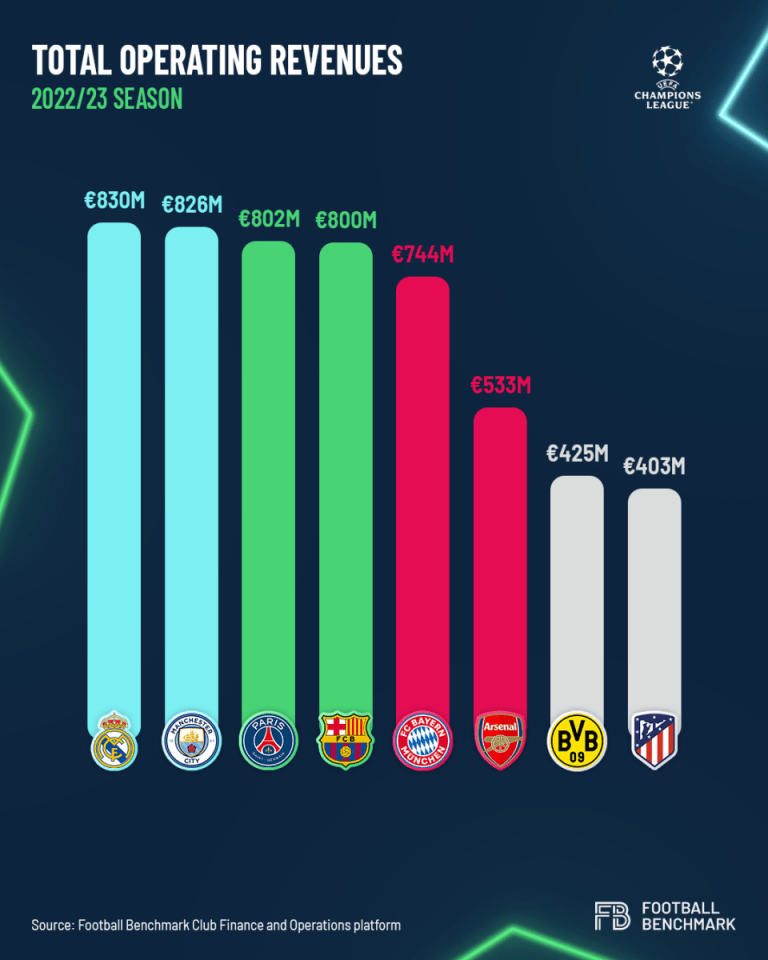Can financial analysis predict the outcome of the Champions League quarter-finals?

Rewritten: It's currently 6:30 in the morning on Tuesday, April 9th, 2024.
If you're tired of European football being too predictable, then this week's Champions League quarter-finals will prove you wrong.

Must - as the financial metrics suggest that the four teams are equally matched and there is no clear winner among them.
Football Benchmark, a detached consultancy specializing in financial analysis in major football and formerly a branch of KPMG, has evaluated this.
Last week, the Football Benchmark released a report identifying the rankings of the remaining teams in the Champions League quarter-finals based on their operating revenue. The report revealed that the matchups were between the top two, third and fourth, fifth and sixth, and seventh and eighth teams.
As an illustration, the teams that make the most money – Real Madrid (€830m) and Manchester City (€826m) – will face off against each other. On the other hand, the teams with the least revenue – Borussia Dortmund (€425m) and Atletico Madrid (€403m) – will also go head to head.
It's the same story for Paris Saint-Germain, Barcelona, Bayern Munich, and Arsenal. They all have different amounts of money, with PSG (€802m) and Barca (€800m) having the most, and Arsenal (€533m) having the least. The teams also have a similar wage bill, but again, PSG and Barca are on top.

If these expectations are met during the games on Tuesday and Wednesday, we can anticipate an exciting, or at least an uncertain, second round of matches next week.
Naturally, this evaluation is not flawless since it relies exclusively on economic information. Despite the fact that financial strength is strongly linked to success, it is not an absolute assurance, as Manchester United and Chelsea supporters can presently affirm.
Additionally, the statistics referenced by Football Benchmark only pertain to the previous season, as they are the latest ones obtainable. However, this implies that any modifications made to areas such as the pay structure in the current season are not reflected in the data.
There are other ways we can impartially evaluate the comparative abilities of the teams. We could consider either Uefa's rankings for the current season, which are adjusted following every stage of the European competitions, or the opinions of betting markets.

The score given by Uefa's coefficient indicates which teams have done the best in the 2023-24 Champions League. Manchester City and Real Madrid are the top teams in terms of revenue, with scores of 26.0 and 25.0 respectively. This could suggest that they are evenly matched, according to theory.
However, in other areas there are differences. Bayern has a coefficient of 23.0, which is the third-best, but their opponents, Arsenal, have a coefficient of 21.0 and are tied for fifth place. This indicates that there may be an advantage for the Germans. The coefficients of Atletico Madrid and Dortmund are more similar, as are those of Barca and PSG. Atletico Madrid has a coefficient of 22.0 and Dortmund has a coefficient of 21.0. Barca has a coefficient of 21.0 and PSG has a coefficient of 20.0.
The chances indicate a different narrative. Even though Bayern has more money and rank, Arsenal is likely to beat them. The defending champions, City, have the best chance of moving on, with Atleti close behind. In terms of betting, PSG is a slightly better bet than Barca.
Therefore, it is not solely based on money when it comes to succeeding in the Champions League, and only time will tell how evenly matched these teams are. However, it is clear that money plays a significant role as all eight teams are among the top 15 in Deloitte's Football Money League.









































